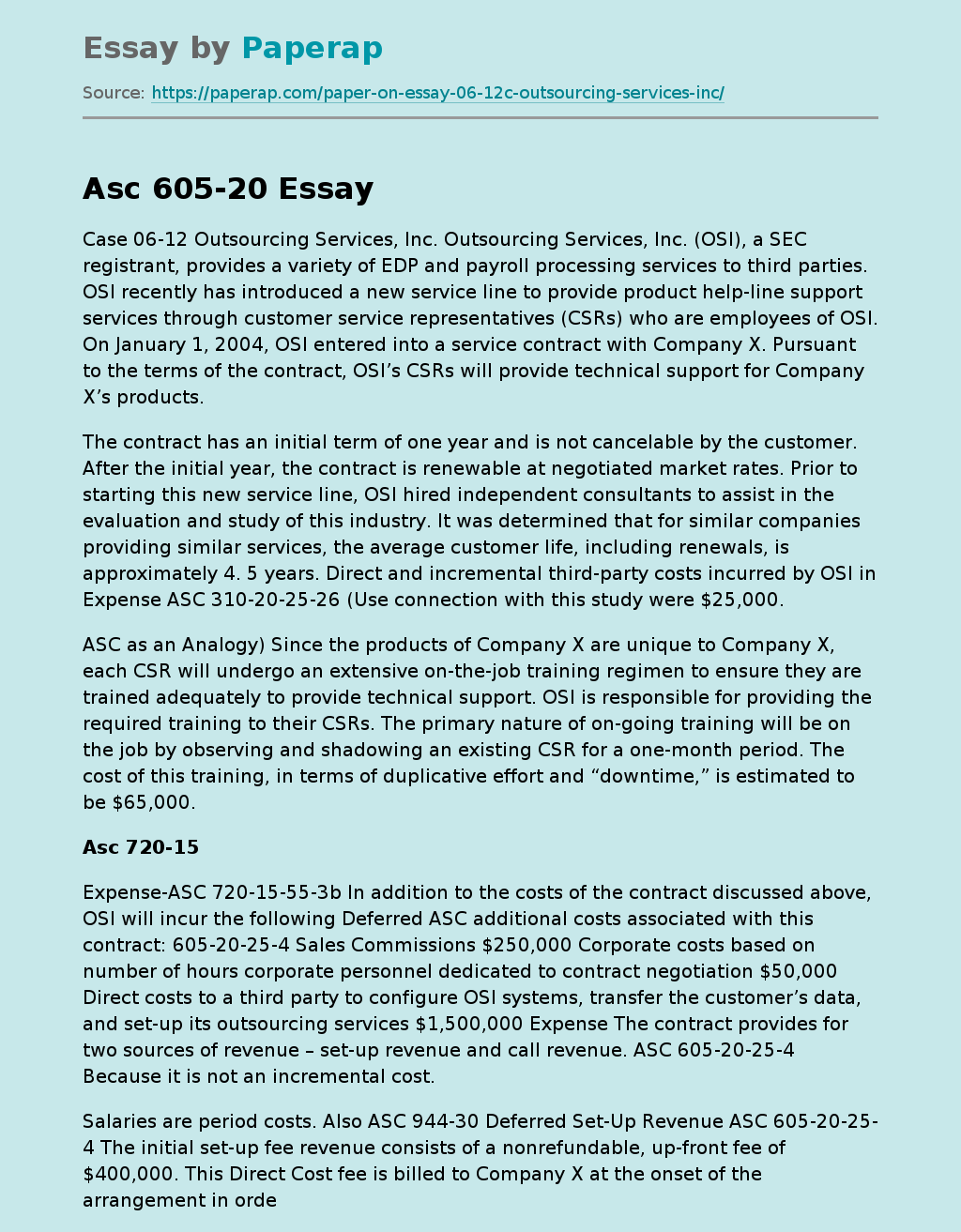Outsourcing Services Inc (OSI) Case Study
Case 06-12 Outsourcing Services, Inc. Outsourcing Services, Inc. (OSI), a SEC registrant, provides a variety of EDP and payroll processing services to third parties. OSI recently has introduced a new service line to provide product help-line support services through customer service representatives (CSRs) who are employees of OSI. On January 1, 2004, OSI entered into a service contract with Company X. Pursuant to the terms of the contract, OSI’s CSRs will provide technical support for Company X’s products.
The contract has an initial term of one year and is not cancelable by the customer.
After the initial year, the contract is renewable at negotiated market rates. Prior to starting this new service line, OSI hired independent consultants to assist in the evaluation and study of this industry. It was determined that for similar companies providing similar services, the average customer life, including renewals, is approximately 4. 5 years. Direct and incremental third-party costs incurred by OSI in Expense ASC 310-20-25-26 (Use connection with this study were ,000.
ASC as an Analogy) Since the products of Company X are unique to Company X, each CSR will undergo an extensive on-the-job training regimen to ensure they are trained adequately to provide technical support. OSI is responsible for providing the required training to their CSRs. The primary nature of on-going training will be on the job by observing and shadowing an existing CSR for a one-month period. The cost of this training, in terms of duplicative effort and “downtime,” is estimated to be $65,000.
Asc 720-15
Expense-ASC 720-15-55-3b In addition to the costs of the contract discussed above, OSI will incur the following Deferred ASC additional costs associated with this contract: 605-20-25-4 Sales Commissions $250,000 Corporate costs based on number of hours corporate personnel dedicated to contract negotiation $50,000 Direct costs to a third party to configure OSI systems, transfer the customer’s data, and set-up its outsourcing services $1,500,000 Expense The contract provides for two sources of revenue – set-up revenue and call revenue.
ASC 605-20-25-4 Because it is not an incremental cost.
Salaries are period costs. Also ASC 944-30 Deferred Set-Up Revenue ASC 605-20-25-4 The initial set-up fee revenue consists of a nonrefundable, up-front fee of $400,000. This Direct Cost fee is billed to Company X at the onset of the arrangement in order to partially offset initial contract set-up and origination costs. Copyright 2005 © Deloitte Development LLC All Rights Reserved. Case 06-12: Outsourcing Services, Inc. Page 2 Call Revenue Call revenue is based on a standard monthly rate of $100,000 ($1,200,000 per year) and is not contingent on the number of inbound or outbound call services provided.
Revenue Recognition Policy OSI’s current policy is to recognize call revenue as earned (i. e. , on a monthly basis). The initial set-up fee revenue is recognized ratably over the estimated customer life. OSI management concluded that the contract consideration allocable to the set-up of this contract does not qualify as a separate unit of accounting pursuant to EITF Issue No. 0021, Revenue Arrangements With Multiple Deliverables, as the set-up costs incurred by OSI do not have stand-alone value to Company X.
Consequently, revenue should be recognized as services are performed pursuant to SEC Staff Accounting Bulletin Topic 13. A. 3(f), Revenue Recognition. As the set-up service does not have stand-alone value, it is appropriate to combine revenue attributable to all of the deliverables (set-up fee and call revenue), and account for the deliverables as a single unit of accounting. In this case, the customer contracted for on-going product support call services, but not for the initial set-up and training of CSRs. The customer would not purchase separately contract set-up and training of CSRs without the on-going services.
The services specified in the arrangement are performed continuously over the arrangement contract term (and any subsequent renewal periods). As such, management of OSI has concluded it is appropriate to recognize set-up revenue on a straight-line basis over the estimated customer life. Cost Deferral Policy In the past, OSI had not entered into transactions in which significant up-front costs were incurred in connection with the set-up and origination of its contracts, and, accordingly, OSI has not adopted a policy for accounting for these types of costs.
OSI has indicated it plans to adopt a policy of deferring all up-front costs related to this contract including system set-up costs, sales commissions, and other contract acquisition costs. Management of OSI believes they will recover these costs and generate substantial profits through their call revenue (initial term and renewal periods), and the up-front costs incurred are a necessary investment in the contract.
Based on customer lifting studies performed by an outside consultant and other industry statistics, OSI expects its contract with Company X to extend beyond the initial contract term and estimates a customer life of approximately 4. 5 years. The total fees (set-up fee and call revenue) over the customer life are expected to exceed the direct costs of the contract, including amortization of the deferred costs before any indirect or Selling, General, and Administrative costs. Copyright 2005 © Deloitte Development LLC All Rights Reserved.
Case 06-12: Outsourcing Services, Inc. Page 3 Required:
• Question 1: Is the accounting policy proposed by OSI to defer costs associated with the origination of the agreement an appropriate policy? What advice would you give OSI regarding its policy election? Question 2: If the accounting policy to defer costs is appropriate, what costs, if any, would be eligible? Question 3: If there are costs for which deferral is appropriate, what is the appropriate period over which to defer these costs?
• • Copyright 2005 © Deloitte Development LLC All Rights Reserved.
Outsourcing Services Inc (OSI) Case Study. (2019, Dec 05). Retrieved from https://paperap.com/paper-on-essay-06-12c-outsourcing-services-inc/

